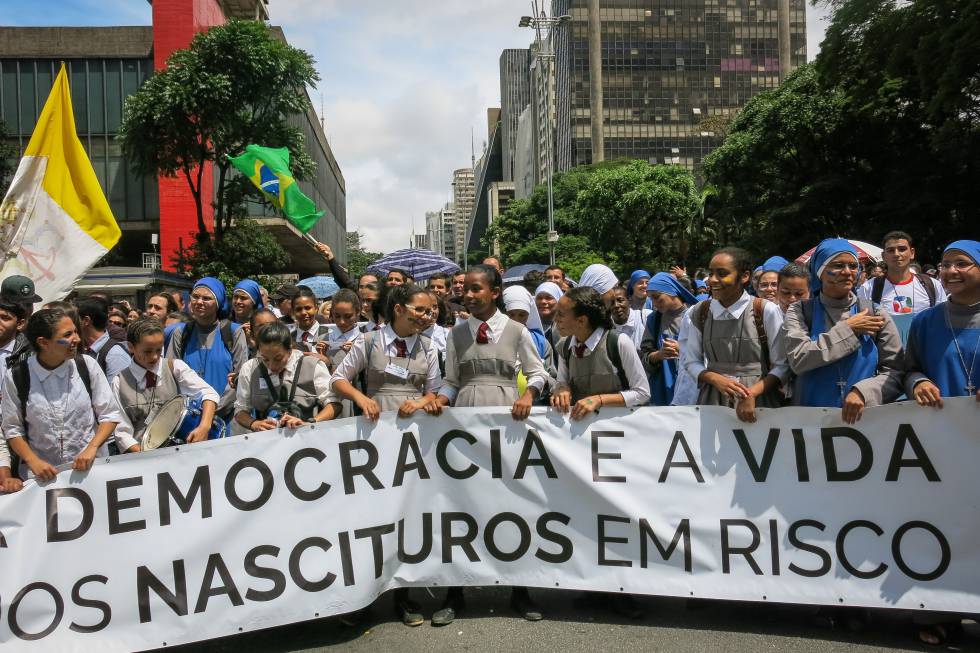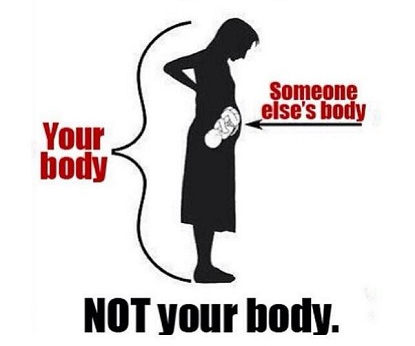RIO DE JANEIRO, BRAZIL – The anti-abortion lobby has adopted a new strategy. The group plans to increase pressure on the federal Congress through the founding of parliamentary fronts in the Legislative Assemblies, and the modification of state constitutions.
Their goal is to end any possibility of legal abortion, even in cases that have been supported by the Brazilian Penal Code since 1940.

Currently there are nine fronts in states around the country – Acre, Alagoas, Maranhão, Minas Gerais, Pernambuco, Rio de Janeiro, Rio Grande do Sul, São Paulo and Sergipe – six of which were launched between September and December 2019.
In two other states, Rondônia and Espírito Santo, congressmen are working toward the launch of two more fronts.
Hermes Rodrigues Nery, Coordinator of the Legislation and Pro-Life Movement, says that the idea is to organize and consolidate the anti-abortion sentiment that exists within the country: “The movement is already capillary. The goal is to grow”.
His proposal is to include the “right to life from conception” in the São Paulo Constitution, which would make state-provided abortion illegal. Brazilian legislation allows the procedure in three situations: pregnancy resulting from rape; when there is risk of death of the pregnant woman; and in case of anencephalic fetus (absence or defective formation of the brain).
“To do it by popular initiative, we need 330,000 signatures, or one percent of the electorate of São Paulo. We already have almost 200,000. And they are not electronic. They’re manual signatures, person to person,” Nery says.
Even if the bill is voted on and approved by São Paulo’s deputies, it would be brought in to question because it defies Brazil’s superior legislation, the Federal Constitution. In Nery’s opinion, this is not a problem: “This initiative has a pedagogical character. It is political. Even if the Supreme Court overturns it, we show that this strength of society exists”.

The coordinator of the Legislation and Life Movement points out that not all states allow amendments through popular initiative, but that the “loophole” exists in São Paulo.
Using this tactic, the movement intends to accelerate the processing of the Draft Amendment to the Constitution, a so-called “PEC of Life”, which provides the inclusion of the right to life “from conception” in Article 5 of the Constitution.
In December 2019, Nery was one of the speakers at the launch ceremony of the Mixed Parliamentary Front Against Abortion and in Defense of Life, which brings together 205 deputies and senators.
Offensive in several countries to withdraw rights
The inspiration for the initiative comes from abroad. “In the United States, they are putting the right to life from conception into state constitutions. In Mexico too,” compares Nery.
The development of bills to strip women of sexual and reproductive rights guaranteed by law follows a pattern that has spread to several countries. “If we look at the moral and political standards that accompany governments who have adopted the shrinking state policy of neoliberalism, we see a very conservative morality tied to religious issues with strong initiatives against sexual and reproductive rights.
It’s not surprising, but it’s very worrying,” says Deborah Duprat, the federal prosecutor for citizens’ rights.

In National Congress, this type of action takes place more intensely in two political blocs. In March 2019, the Parliamentary Front in Defense of Life and Family was formed, led by Congressman Diego Garcia (PODE-PR) and composed only of federal deputies.
The Mixed Parliamentary Front against Abortion and in Defense of Life, led by Representative Chris Tonietto (PSL-RJ), since December, also unites senators. “The front has as its primary function the promotion of public policies for the enhancement of human life since conception,” said the congresswoman at the launch ceremony. “Abortion must be something unthinkable.”
Draft proposes cruel methods to make women give up legal abortion
At the state level, the initiative that sends the strongest signals is the Parliamentary Front in Defense of Life, launched in September, in São Paulo, by Representative Gil Diniz (PSL).
Sixty-five days after the front was formed, the congressman began to work on a project that puts obstacles in the way of having an abortion legally, and provides for the admission of women likely to have an illegal abortion.
Under the bill, the performance of an abortion in the state, even in cases allowed by the federal Penal Code, will be conditional on the presentation of a judicial permit, to be submitted by the state prosecutor general.
If the prosecutor general disagrees with the procedure, the woman can appeal against the decision; if the prosecutor agrees; the woman will have to wait at least 15 days before going through with the procedure.

During this period, she will receive psychological care “with a view to dissuading her from the idea of performing the abortion” and will be required to accompany a “demonstration of abortion techniques with an explanation of the acts of destruction, slicing and sucking of the fetus, as well as the fetus’s reaction to such measures”.
If the woman does not have the right to legal abortion and shows a willingness to resort to illegal abortion, the proposal made by the deputy foresees that she will be jailed.
Infectologist Ivete Boulos, coordinator of Navis, the Center for Assistance to Victims of Sexual Violence at the Hospital das Clínicas in São Paulo, has voiced her concern with projects such as these, which aim to withdraw rights and impose more violence against women.
“One of them foresees a delay of at least two weeks for legal abortion. During this period, the government should offer the woman a psychologist, who will work to dissuade her from interrupting the pregnancy. She will watch videos about what happens to the fetus. It is an exploitation of the suffering of the woman, who arrives pregnant after a rape and will be called a murderer.”
“It’s something that emerges very quietly and is gaining weight until it translates into an avalanche of state and municipal laws”. Their advocates say they oppose what they call “ideological indoctrination” in schools, on a spectrum that ranges from discussions about environmental problems to gender, family and sex education issues.
According to the United Nations High Commissioner for Human Rights, the projects promoted by the School without a Party movement threaten basic human rights.

As of 2015, bills inspired by this movement have been presented in municipal chambers, legislative assemblies and the National Congress.
According to Duprat, the Federal Prosecutor’s Office for Citizens’ Rights only had a more comprehensive understanding of what was happening in education, through the mapping of bills made by LGBTQ+ entities and associations, a population immediately affected by the restrictions contained in these proposals.
In Duprat’s view, society is faced with issues that need to be taken to the Federal Supreme Court (STF). “Any initiative that makes it more difficult for women to make decisions in the case of legal abortions or constrains them in the exercise of their sexual and reproductive autonomy is a constitutional issue because it reaches the core of the autonomy, equality and dignity of the person and needs to be challenged. We don’t know what the Supreme Court’s position may be, but there needs to be provocation,” says prosecutor Duprat.
The Supreme Court doesn’t have the power to bar discussions about bills pending in legislatures, or to take preventive control of the constitutionality of a bill before it is voted on and turned into law. “Even with regard to constitutional amendments, the STF is very cautious. It prefers to let them have a segment in Parliament, only after they are approved to be discussed in court,” Duprat says. State and municipal laws can also be submitted to scrutiny by the STF.
The legislature itself is beginning to show its discomfort with this escalation in ultraconservative ideology. In early December, an institutional campaign to combat gender-based violence in politics was launched.

The initiative was proposed by Representative Jandira Feghali (PCdoB-RJ), leader of the Minority, the Secretariat of Women and the 1st Secretariat of the Federal Chamber, and has the support of the President of the Chamber of Deputies, Rodrigo Maia (DEM-RJ).
Throughout the year, the insertion of the word gender in committees, bills and official documents has sparked turbulence and protests from radical religious and right-wing deputies. The last attack on abortion rights in 2019 came from President Jair Bolsonaro.
“Among the goals of the 2030 agenda are the harmful ideology of gender and abortion, under the guise of sexual and reproductive rights,” he wrote on his Twitter account on December 31, justifying his veto to the article that included “the pursuit of sustainable development goals” of the UN among the guidelines of the PPA (Multi-Year Plan) 2020-2023.

